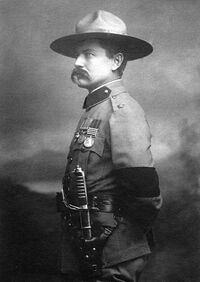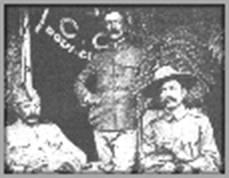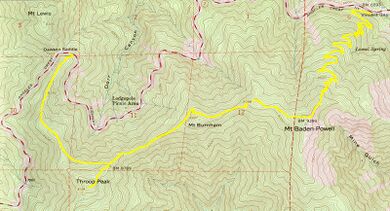Frederick Russell Burnham: Forskelle mellem versioner
Bot egel (diskussion | bidrag) m (r2.7.4) (Robot tilføjer es:Frederick Russell Burnham) |
Jørgen (diskussion | bidrag) (Påbegyndt swiki - fjernet irrelevante citater og afsnit. Kopieret et afsnit fra WP:en, der passende kan oversættes/omskrives til SPOV) |
||
| Linje 2: | Linje 2: | ||
[[Fil:Burnham 1902 loc collection.jpg|thumb|200px|right|Major Frederick Russell Burnham, Chef for Spejderne]] | [[Fil:Burnham 1902 loc collection.jpg|thumb|200px|right|Major Frederick Russell Burnham, Chef for Spejderne]] | ||
'''Frederick Russell Burnham''' ([[11. maj]] [[1861]] – [[1. september]] [[1947]]) var en spejder i det amerikanske militær, og kendt for sin indsats for den engelske hær i kolonierne i | '''Frederick Russell Burnham''' ([[11. maj]] [[1861]] – [[1. september]] [[1947]]) var en spejder i det amerikanske militær, og kendt for sin indsats for den engelske hær i kolonierne i Afrika samt for at inspirere [[Robert Baden-Powell]] til at etablere den internationale [[Spejderbevægelsen|spejderbevægelse]]. | ||
Han er militært mest kendt for sin indsats i [[Anden Boerkrig]], Den første Matabelekrig, og Den anden Matabelekrig. | |||
=="Father of Scouting"== | |||
[[File:Bp burnham ca1910.jpg|thumb|Burnham (standing) & Baden-Powell (right) at a Boy Scout event, ca. 1910]] | |||
Burnham was already a celebrated scout when he first befriended Baden-Powell during the Second Matabele War, but the backgrounds of these two scouts was as strange a contrast as it is possible to imagine.{{sfn|West|1932|p=137}} From his youth on the open plains, Burnham's earliest playmates were Sioux Indian boys and their ambitions pointed to excelling in the lore and arts of the trail and together they dreamed of some day becoming great scouts.{{sfn|West|1932|p=137-8}} When Burnham was a teenager he supported himself by hunting game and making long rides for Western Union through the California deserts, his early mentors were wise old scouts of the American West, and by nineteen he was a seasoned scout chasing and being chased by Apache.{{sfn|West|1932|p=138}} The British scout he would later befriend and serve with in Matabeleland, Baden-Powell, was born in urban London and had graduated from Charterhouse, one of its most famous preparatory schools.{{sfn|West|1932|p=138}} At nineteen, Baden-Powell passed an exam that gave him an immediate commission in the Army, only it would take several years before he was engaged in any active service.{{sfn|West|1932|p=138}} Even so, from a young age Baden-Powell developed the ambition to become a scout and when these two men met in 1896, Baden-Powell was an Army intelligence officer and a brilliant outdoorsman who had previously organized a small scouting section in his regiment, had written his book ''Reconnaissance and Scouting'', and had served in India, Afghanistan, Natal, and Ashanti, and Burnham was Gen. Carrington's Chief of Scouts.{{sfn|West|1932|p=142}} | |||
During the siege of Bulawayo, these two men rode many times into the Matobo Hills on patrol, and it was in these African hills that Burnham first introduced Baden-Powell to the ways and methods of the [[indigenous peoples of the Americas]], and taught him ''woodcraft''<!-- Do not link this. --> (better known today as scoutcraft). Baden-Powell had written at length about reconnaissance and tracking, but from Burnham he learned many new dimensions such as how to travel in wild country without either a compass or map, how to discover nearby dangers by observing animals, and the many techniques for finding potable water.{{sfn|Jeal|1989|p=189}} So impressed was Baden-Powell by Burnham's Scouting spirit that he fondly told people he "sucked him dry" of all he could possibly tell.{{sfn|Anglo Boer War Museum|2007}} It was also here that Baden-Powell began to wear his signature [[Stetson]] [[campaign hat]] and [[neckerchief]], like those worn by Burnham, for the first time.{{sfn|Jeal|1989|p=188}} Both men recognized that wars were changing markedly and the British Army needed to adapt; so during their joint scouting missions, Baden-Powell and Burnham discussed the concept of a broad training program in woodcraft for young men, rich in exploration, [[Tracking (Scouting)|tracking]], [[fieldcraft]], and self-reliance. In Africa, no scout embodied these traits more than Burnham.{{sfn|Prichard|1919|pp=191–193}} In his first scouting handbook, ''Aids to Scouting'', Baden-Powell published many of the lessons he learned from Burnham and this book was later used by boys' groups as a guide to outdoor fun.{{sfn|Arrow|2013}} At the urging of several youth leaders, Baden-Powell decided to adapt his scouting handbook specifically to training boys.{{sfn|Peterson|2004}} While Baden-Powell went on to refine the concept of Scouting, publish ''[[Scouting for Boys]]'', and become the founder of the international Scouting movement, Burnham has been called the movement's father.{{sfn|1st Lacock Scout Group|2013}}{{sfn|Forster|2007}} [[James E. West (Scouting)|James E. West]], [[Chief Scout Executive]] for the Boy Scouts of America, summarized Burnham's relevance to Scouting thusly: ''There is an especial significance for those of us in Scouting in this man's list, for he was engaged for this work by Lord Baden Powell, who was then connected with the British Army in Africa, and who had unbounded admiration for the scouting methods of Frederick Burnham. So these two pioneers, each of whom was to have such immeasurable influence in restoring the old traditions of American youth, met in Africa, years before the Scouting movement was ever thought of.''{{sfn|West|1935|p=146}} | |||
{{quote box | |||
| width=29em| border = 1px | align = left | bgcolor = #c6dbf7 | |||
| quote = Burnham is the sufficient and heroic figure, model and living example, who inspired and gave Baden-Powell the plan for the program and the code of honor of Scouting for Boys. | |||
| source = — E.B. DeGroot, BSA Executive (1944).{{sfn|DeGroot|1944|pp=6–7}} | |||
}} | |||
[[File:Scout trail usgs.jpg|thumb|upright=1.3|Park service trail connecting Mt. Burnham to Mt. Baden-Powell]] | |||
Burnham later became close friends with others involved in the Scouting movement in the United States, such as Theodore Roosevelt, the Chief Scout Citizen, and [[Gifford Pinchot]], the Chief Scout Forester.{{sfn|Davis|1906|p=219, 233}}{{sfn|Coates|2007|p=100}} The [[Boy Scouts of America]] (BSA) made Burnham an Honorary Scout in 1927,{{sfn|Boy Scouts of America|1933|p=611}} and for his noteworthy and extraordinary service to the Scouting movement, Burnham was bestowed the highest commendation given by the Boy Scouts of America, the Silver Buffalo Award, in 1936.{{sfn|Boy Scouts of America|2012}} Throughout his life he remained active in Scouting at both the regional and the national level in the United States and he corresponded regularly with Baden-Powell on Scouting topics.{{sfn|Everett|1952|pp=117–119}}{{sfn|Weideman|2006|p=6,10}} | |||
The low-key Burnham and Baden-Powell remained close friends for their long lives. The seal on the Burnham — Baden-Powell letters at Yale and [[Stanford University|Stanford]] expired in 2000 and the true depth of their friendship and love of Scouting has again been revealed.{{sfn|van Wyk|2003|pp=554, 568}} In 1931, Burnham read the speech dedicating [[Mount Baden-Powell]] in California,{{sfn|Geographical Names Information System|2013}}{{sfn|Burnham|1944|pp=xxv–xxix}} to his old Scouting friend.{{sfn|van Wyk|2003|pp=536–537}} Their friendship, and equal status in the world of Scouting and conservation, is honored with the dedication of the adjoining peak, [[Mount Burnham]], in his honor.{{sfn|Everett|1952|pp=117–119}}{{sfn|United States Geological Survey|2013}} | |||
Burnham's descendants followed in his footsteps and are active in Scouting and in the military. His son Roderick enlisted in the U.S. Army and fought in [[World War I]] France.{{sfn|Lott|1972|p=201}} His grandson, Frederick Russell Burnham II, was a leader in the BSA and a [[Vietnam War]] veteran. His great-grandson, [[Russell Adam Burnham]] is an [[Eagle Scout (Boy Scouts of America)|Eagle Scout]] and was [[United States Army]]'s Soldier of the Year in 2003.{{sfn|Strasser|2007}}{{sfn|United States Army|2004}} | |||
== Medaljer og dekorationer == | == Medaljer og dekorationer == | ||
Versionen fra 13. aug. 2013, 10:08
Frederick Russell Burnham (11. maj 1861 – 1. september 1947) var en spejder i det amerikanske militær, og kendt for sin indsats for den engelske hær i kolonierne i Afrika samt for at inspirere Robert Baden-Powell til at etablere den internationale spejderbevægelse.
Han er militært mest kendt for sin indsats i Anden Boerkrig, Den første Matabelekrig, og Den anden Matabelekrig.
"Father of Scouting"
Burnham was already a celebrated scout when he first befriended Baden-Powell during the Second Matabele War, but the backgrounds of these two scouts was as strange a contrast as it is possible to imagine.Skabelon:Sfn From his youth on the open plains, Burnham's earliest playmates were Sioux Indian boys and their ambitions pointed to excelling in the lore and arts of the trail and together they dreamed of some day becoming great scouts.Skabelon:Sfn When Burnham was a teenager he supported himself by hunting game and making long rides for Western Union through the California deserts, his early mentors were wise old scouts of the American West, and by nineteen he was a seasoned scout chasing and being chased by Apache.Skabelon:Sfn The British scout he would later befriend and serve with in Matabeleland, Baden-Powell, was born in urban London and had graduated from Charterhouse, one of its most famous preparatory schools.Skabelon:Sfn At nineteen, Baden-Powell passed an exam that gave him an immediate commission in the Army, only it would take several years before he was engaged in any active service.Skabelon:Sfn Even so, from a young age Baden-Powell developed the ambition to become a scout and when these two men met in 1896, Baden-Powell was an Army intelligence officer and a brilliant outdoorsman who had previously organized a small scouting section in his regiment, had written his book Reconnaissance and Scouting, and had served in India, Afghanistan, Natal, and Ashanti, and Burnham was Gen. Carrington's Chief of Scouts.Skabelon:Sfn
During the siege of Bulawayo, these two men rode many times into the Matobo Hills on patrol, and it was in these African hills that Burnham first introduced Baden-Powell to the ways and methods of the indigenous peoples of the Americas, and taught him woodcraft (better known today as scoutcraft). Baden-Powell had written at length about reconnaissance and tracking, but from Burnham he learned many new dimensions such as how to travel in wild country without either a compass or map, how to discover nearby dangers by observing animals, and the many techniques for finding potable water.Skabelon:Sfn So impressed was Baden-Powell by Burnham's Scouting spirit that he fondly told people he "sucked him dry" of all he could possibly tell.Skabelon:Sfn It was also here that Baden-Powell began to wear his signature Stetson campaign hat and neckerchief, like those worn by Burnham, for the first time.Skabelon:Sfn Both men recognized that wars were changing markedly and the British Army needed to adapt; so during their joint scouting missions, Baden-Powell and Burnham discussed the concept of a broad training program in woodcraft for young men, rich in exploration, tracking, fieldcraft, and self-reliance. In Africa, no scout embodied these traits more than Burnham.Skabelon:Sfn In his first scouting handbook, Aids to Scouting, Baden-Powell published many of the lessons he learned from Burnham and this book was later used by boys' groups as a guide to outdoor fun.Skabelon:Sfn At the urging of several youth leaders, Baden-Powell decided to adapt his scouting handbook specifically to training boys.Skabelon:Sfn While Baden-Powell went on to refine the concept of Scouting, publish Scouting for Boys, and become the founder of the international Scouting movement, Burnham has been called the movement's father.Skabelon:SfnSkabelon:Sfn James E. West, Chief Scout Executive for the Boy Scouts of America, summarized Burnham's relevance to Scouting thusly: There is an especial significance for those of us in Scouting in this man's list, for he was engaged for this work by Lord Baden Powell, who was then connected with the British Army in Africa, and who had unbounded admiration for the scouting methods of Frederick Burnham. So these two pioneers, each of whom was to have such immeasurable influence in restoring the old traditions of American youth, met in Africa, years before the Scouting movement was ever thought of.Skabelon:Sfn
Burnham later became close friends with others involved in the Scouting movement in the United States, such as Theodore Roosevelt, the Chief Scout Citizen, and Gifford Pinchot, the Chief Scout Forester.Skabelon:SfnSkabelon:Sfn The Boy Scouts of America (BSA) made Burnham an Honorary Scout in 1927,Skabelon:Sfn and for his noteworthy and extraordinary service to the Scouting movement, Burnham was bestowed the highest commendation given by the Boy Scouts of America, the Silver Buffalo Award, in 1936.Skabelon:Sfn Throughout his life he remained active in Scouting at both the regional and the national level in the United States and he corresponded regularly with Baden-Powell on Scouting topics.Skabelon:SfnSkabelon:Sfn
The low-key Burnham and Baden-Powell remained close friends for their long lives. The seal on the Burnham — Baden-Powell letters at Yale and Stanford expired in 2000 and the true depth of their friendship and love of Scouting has again been revealed.Skabelon:Sfn In 1931, Burnham read the speech dedicating Mount Baden-Powell in California,Skabelon:SfnSkabelon:Sfn to his old Scouting friend.Skabelon:Sfn Their friendship, and equal status in the world of Scouting and conservation, is honored with the dedication of the adjoining peak, Mount Burnham, in his honor.Skabelon:SfnSkabelon:Sfn
Burnham's descendants followed in his footsteps and are active in Scouting and in the military. His son Roderick enlisted in the U.S. Army and fought in World War I France.Skabelon:Sfn His grandson, Frederick Russell Burnham II, was a leader in the BSA and a Vietnam War veteran. His great-grandson, Russell Adam Burnham is an Eagle Scout and was United States Army's Soldier of the Year in 2003.Skabelon:SfnSkabelon:Sfn
Medaljer og dekorationer
- 1893 – British South Africa Company Medal – Storbritanien.
- 1900 – Distinguished Service Order (DSO) – Storbritanien.
- 1900 – Queen's South Africa Medal – Storbritanien.
- 1927 – Honorary Scout – Spejderbevægelsen, USA.
- 1936 – Silver Buffalo Award – Spejderbevægelsen, USA.
- 1951 – Mount Burnham – Californien, USA.
Vigtige værker
Et lille udpluk af bibliografien:
- Scouting on Two Continents. (1926)
- Fra Alaska Til Kap: Pionerliv i Amerikas minelejre og på Sydafrikas højsletter (1929)
- Scouting Against the Apache. The Boy Scout's Book of True Adventure, Fourteen Honorary Scouts, with foreword by Theodore Roosevelt and biographical notes by James E. West. (1931)
- Taps for the Great Selous. Hunting Trails on Three Continents, Grinnell, George Bird, Kermit Roosevelt, W. Redmond Cross, and Prentiss N. Gray (1933)
- Taking Chances. (1944)
Bøger – udvalgte titler
- Real Soldiers of Fortune. Richard Harding Davis. (1906)
- The Boys' Own Book of Adventurers. Albert Britt. (1923)
- Folks Ushud Know; Interspersed with Songs of Courage. Lee Shippey (1930)
- He-who-sees-in-the-dark; the boys' story of Frederick Burnham, the American scout. James E. West; illustrated: Robert Baden-Powell (1932)
- Major Burnham of the Shangani Patrol. J. P. Lott, Rhodesiana Magazine (September 1976)
- Major F. R. Burnham, D.S.O. J. P. Lott, Rhodesiana Magazine, #36. (Martz 1977)
- An American family on the African frontier: the Burnham family letters, 1893-1896. Mary y Richard Bradford. (1993)
- Burnham: King of Scouts.Peter van Wyk. ISBN 1-4120-0901-4. (2003)
Noter
| |||||||||||||||||||||||


